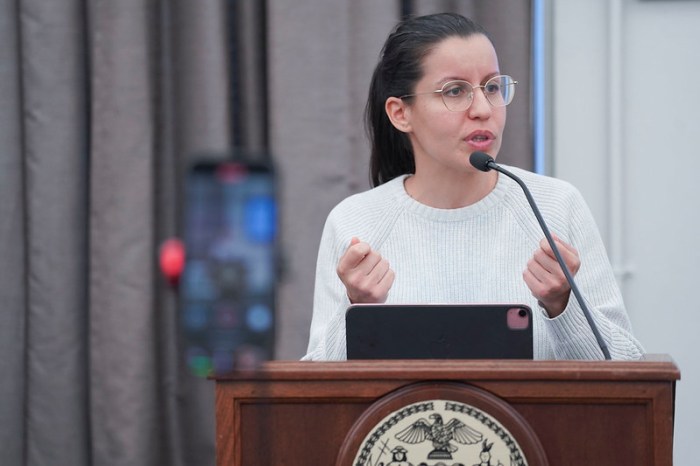
Council Member Tiffany Cabán speaks at City Hall after the R.E.C.E.I.P.T.S. Act passes the Council on May 28, 2025. (Photo credit: Gerardo Romo / NYC Council Media Unit)
June 3, 2025 By Czarinna Andres
The New York City Council passed legislation on Wednesday, May 28, that will bring greater transparency and accountability to the city’s public benefits system, a move that Council Member Tiffany Cabán and advocates hailed as a victory for low-income New Yorkers navigating bureaucratic barriers.
The bill, Intro 1148 and known as the R.E.C.E.I.P.T.S. Act—short for Records Ensuring Clarity, Equity, and Integrity in Public Transactions and Services—requires the Department of Social Services (DSS) to provide application confirmation notices and document receipts to individuals applying for Supplemental Nutrition Assistance Program (SNAP) benefits and cash assistance.
Under the legislation, applicants must receive confirmation notices within 48 hours and document receipts within five business days of submission. These receipts will indicate the date of the submission, a list of received documents, and whether they are complete and legible. Additionally, DSS will be required to provide electronic access to copies of submitted materials. The department must also assess the feasibility of expanding this confirmation process to additional benefits.
“I’m proud to be the lead sponsor of the R.E.C.E.I.P.T.S. Act,” said Cabán, who represents Council District 22, which includes the neighborhoods of Astoria and parts of Woodside, East Elmhurst, and Jackson Heights. “This legislation marks an important step toward greater transparency, accountability, and trust in our city’s public benefits system. These may seem like minor procedural updates, but for those seeking vital support, they can mean the difference between clarity and confusion.”
Cabán emphasized the practical effect of the law, citing frequent complaints from constituents who submitted documents to DSS or the Human Resources Administration (HRA) and never received acknowledgment.
The bill passed with widespread support from the Council and was backed by major social service providers and advocacy organizations citywide.
“By increasing transparency in the application process to receive benefits, New Yorkers will have more clarity and success in accessing these critical resources,” said Council Speaker Adrienne Adams. “I thank Council Member Cabán for her leadership on this legislation.”
The bill was co-sponsored by numerous Council Members who described the measure as a “common-sense” reform with wide-reaching implications.
“Applying for public benefits should not feel like sending your documents into a void,” said Majority Leader Amanda Farías. “When families are in crisis, they deserve timely confirmation, clear guidance, and the peace of mind that their paperwork hasn’t just disappeared into the system.”
Council Member Alexa Avilés added that the change would improve the ability of elected officials to advocate for their constituents. “We hope that this legislation will save New Yorkers valuable resources, so we can spend less time tracking down application documents and more time serving our constituents.”
Social service leaders echoed that sentiment, pointing to the challenges their clients face in dealing with a historically opaque system.
“When people don’t have to spend countless hours navigating unclear, redundant, and demoralizing systems, they can focus their time and energy on what truly matters,” said Bishop Mitchell Taylor, CEO and co-founder of Urban Upbound. “The R.E.C.E.I.P.T.S. Act brings much-needed clarity and accountability to the benefits process.”
Cabán also took to social media to raise awareness about the legislation, posting a video explainer that outlines the key provisions of the R.E.C.E.I.P.T.S. Act and its impact on public benefits applicants. The video has garnered more than 21,000 views across platforms.
The Department of Social Services, which administers SNAP and cash assistance through the Human Resources Administration, has faced repeated scrutiny over delays and lack of communication with applicants—especially during the COVID-19 pandemic, when demand for services spiked.
The law also directs DSS to release a report evaluating the resources and potential barriers to expanding this level of confirmation across all benefit programs. It will include an implementation plan, legal analysis, and estimated timelines.
Council Member Jennifer Gutiérrez said the bill directly responds to constituent concerns. “Too often, they submit documents for SNAP or cash assistance and hear nothing back,” she said. “We’re bringing long-overdue clarity and accountability to a process that impacts our city’s most vulnerable families.”
Council Member Shahana Hanif, a co-chair of the Council’s Progressive Caucus, said the legislation aligns with the city’s values. “These agencies are lifelines for New Yorkers in moments of urgent need,” she said. “This new law will strengthen their ability to serve with efficiency and compassion.”
The law will take effect 180 days after being signed by the mayor, allowing time for DSS to implement the new protocols and prepare its report.
